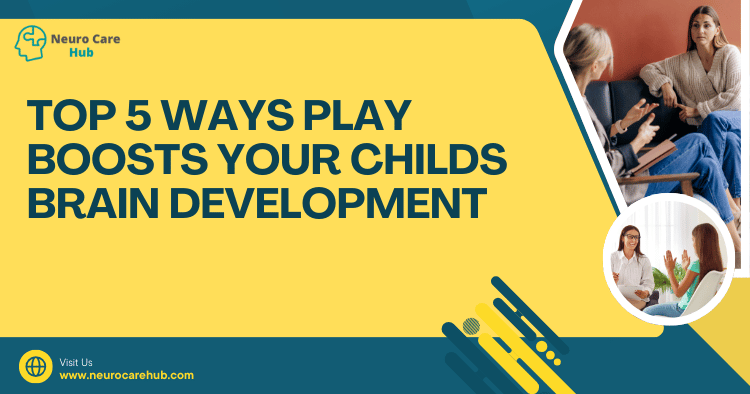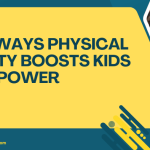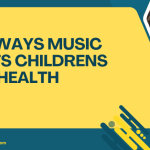Table of Contents
- Introduction
- 1. Encourages Cognitive Skills
- 2. Fosters Social Skills
- 3. Enhances Emotional Intelligence
- 4. Promotes Physical Development
- 5. Stimulates Creativity and Imagination
- Conclusion
- FAQs
Introduction
Play is often underestimated when it comes to child development. However, it plays a pivotal role in shaping a child’s brain and overall growth. From cognitive skills to emotional intelligence, the benefits of play are extensive. In this article, we’ll explore the top five ways play boosts your child’s brain development and why incorporating play into their daily routine is essential.
1. Encourages Cognitive Skills
Play is a natural way for children to learn and develop cognitive skills. Engaging in different forms of play—whether it’s building with blocks, solving puzzles, or playing pretend—stimulates various areas of the brain responsible for thinking, learning, and problem-solving.
“Play is the highest form of research.” – Albert Einstein
How Play Enhances Cognitive Skills:
- Problem-Solving: Activities like puzzles teach children to strategize and think critically. They learn to identify problems and come up with solutions.
- Memory Improvement: Games that require remembering rules or sequences, such as Simon Says, enhance memory capacity.
- Language Development: Interactive play, especially with peers, encourages communication and vocabulary expansion.
Visual Element: Here’s a quick table outlining cognitive skills developed through different types of play:
| Type of Play | Cognitive Skills Developed |
|---|---|
| Building Blocks | Spatial awareness, problem-solving |
| Puzzles | Critical thinking, memory |
| Dress-Up Play | Imagination, language skills |
| Board Games | Strategy, counting, rule-following |
For further reading on cognitive development through play, check out Zero to Three.
2. Fosters Social Skills
Play is inherently social. Whether it’s playing tag at the park or engaging in cooperative games, children learn to interact with others, share, and develop friendships. This social aspect of play is crucial for developing strong interpersonal skills.
“Children learn as they play. Most importantly, in play, children learn how to learn.” – O. Fred Donaldson
Benefits of Social Play:
- Communication Skills: Children learn how to express themselves verbally and non-verbally while playing with others.
- Conflict Resolution: Playing with peers often leads to disagreements, teaching children to negotiate and resolve conflicts amicably.
- Empathy Development: Role-playing and imaginative play encourage children to see things from different perspectives.
Visual Element: Here’s a summary of social skills enhanced by play:
| Type of Play | Social Skills Developed |
|---|---|
| Cooperative Games | Teamwork, communication |
| Role Play | Empathy, perspective-taking |
| Group Sports | Leadership, conflict resolution |
For more insights into social development, visit the American Academy of Pediatrics.
3. Enhances Emotional Intelligence
Emotional intelligence (EQ) is as important as cognitive intelligence (IQ) for a child’s success. Play helps children understand their own emotions and those of others, cultivating empathy and self-regulation.
“Emotional intelligence is the ability to identify and manage your own emotions and the emotions of others.” – Daniel Goleman
How Play Affects Emotional Intelligence:
- Self-Expression: Through play, children can express their feelings, fears, and aspirations in a safe environment.
- Understanding Emotions: Activities that involve role-playing help children recognize various emotions and learn appropriate responses.
- Resilience: Playing often involves overcoming failures, teaching children to bounce back from setbacks and develop resilience.
Visual Element: The following table summarizes emotional skills developed through various types of play:
| Type of Play | Emotional Skills Developed |
|---|---|
| Imaginative Play | Self-expression, empathy |
| Sports | Resilience, teamwork |
| Arts and Crafts | Self-esteem, emotional regulation |
For additional resources on emotional intelligence, check out The Greater Good Science Center.
4. Promotes Physical Development
Physical play is not only fun; it is critical for a child’s physical health and brain development. Activities like running, jumping, and climbing improve motor skills and coordination, all of which are linked to brain development.
“Physical fitness is not only one of the most important keys to a healthy body, it is the basis of dynamic and creative intellectual activity.” – John F. Kennedy
Physical Benefits of Play:
- Fine Motor Skills: Activities like drawing, cutting, and manipulating small objects hone fine motor skills vital for writing and other tasks.
- Gross Motor Skills: Running, jumping, and playing sports improve coordination and balance, crucial for physical development.
- Brain Connectivity: Physical activity increases oxygen flow to the brain, promoting neural connectivity and overall brain health.
Visual Element: Here’s a breakdown of physical skills developed through different types of play:
| Type of Play | Physical Skills Developed |
|---|---|
| Outdoor Games | Gross motor skills, coordination |
| Arts and Crafts | Fine motor skills, hand-eye coordination |
| Dance | Rhythm, balance, body awareness |
For more on the importance of physical activity for children, see the Centers for Disease Control and Prevention (CDC).
5. Stimulates Creativity and Imagination
Creative play is essential for fostering imagination and innovation. When children engage in imaginative play, they learn to think outside the box and develop their creativity, which is vital for problem-solving later in life.
“Creativity is intelligence having fun.” – Albert Einstein
How Play Sparks Creativity:
- Open-Ended Play: Activities like building with blocks or arts and crafts allow children to explore their creativity without restrictions.
- Role-Playing: Pretend play encourages children to create stories and scenarios, enhancing their imaginative capabilities.
- Experimentation: Play provides a safe space for children to experiment with ideas, leading to innovative thinking.
Visual Element: Here’s a summary of creativity skills developed through play:
| Type of Play | Creativity Skills Developed |
|---|---|
| Arts and Crafts | Imagination, innovation |
| Dress-Up Play | Storytelling, creativity |
| Building Toys | Problem-solving, design thinking |
For further exploration of play and creativity, check out the National Association for the Education of Young Children (NAEYC).
Conclusion
In summary, play is a powerful tool that significantly contributes to a child’s brain development. From enhancing cognitive skills to fostering emotional intelligence, the various forms of play offer myriad benefits that prepare children for future challenges. By ensuring your child has ample opportunities for play, you are setting the foundation for a well-rounded and healthy development.
“The creation of something new is not accomplished by the intellect but by the play instinct.” – Carl Jung
FAQs
Q: How much playtime should a child have each day?
A: The American Academy of Pediatrics recommends that children have at least 1 hour of unstructured play each day.
Q: What types of play are best for brain development?
A: A mix of physical, imaginative, and social play is ideal for brain development. Activities that encourage creativity and problem-solving are particularly beneficial.
Q: Is screen time considered play?
A: While some educational screen time can have benefits, active play—especially outdoors—has more significant advantages for brain and physical development.
By understanding and promoting the role of play in brain development, we can help nurture happier, healthier, and more capable children. Happy playing!
Also Look For
To further enrich your understanding of neuro care and child development, you can explore these insightful articles on neuro care and related topics:
- Top 5 Essential Insights on Neuro Care You Need to Know
- Top 5 Reasons Neuro Care is Essential in Modern Medicine
- Top 5 Lifestyle Changes for Better Neuro Health
- Top 5 Signs You Need Neuro Care for Brain Health
- Top 5 Benefits of…






